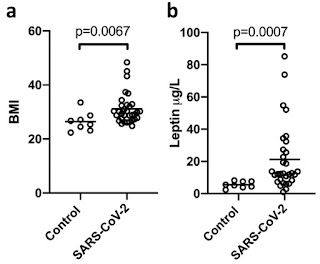Early in the COVID-19 pandemic, it was recognized that obesity seemed to be related to respiratory failure, or severe acute respiratory syndrome (SARS). These researchers tested whether leptin, a cytokine produced by fat cells in the gut and working on brain cells to influence hunger, might be correlated with risk, perhaps a biomarker of risk.
They compared 31 obese COVID patients on ventilators with 8 non-infected, non-obese critically ill patients. They found much higher levels of leptin in the patients with COVID (averages 21 vs 6 ug/l, with very good statistical significance, p = .0007). The individual measurements overlap (shown), so leptin is not ‘the’ biomarker but clearly related. Whether related as a cause or consequence only a prospective trial could test rigorously.
Figure 2 detail: BMI of patients panel A and Leptin levels panel B. In each panel, ‘control’ critically ill patients, left, COVID patients right.
The authors hypothesized that elevated leptin causes a ‘hyper immune’ state, especially stimulating lung epithelial cells. They noted similar observation previously published for influenza and MERS. Since this paper was published, several groups have reported similar findings 2020 paper that was largely replicated (see review, which cites 3 later papers). Ironically, shutdowns that have been effective in protecting many people from infection have also increased sedentary lifestyles, BMI, and risk.




No comments:
Post a Comment